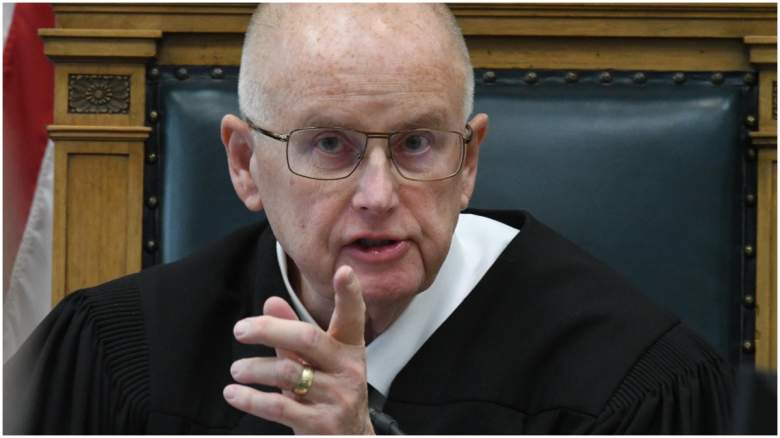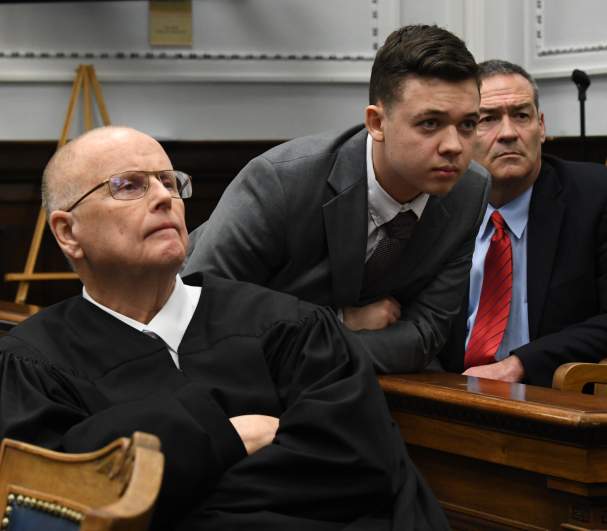
Getty Judge Bruce Schroeder
Bruce Schroeder is the Kenosha County circuit judge who is presiding over the Kyle Rittenhouse trial.
Schroeder, 75, the longest serving current circuit judge in Wisconsin, has become the focal point of controversy in some corners during the trial for everything from his pretrial rulings to his ringtone to his stern demeanor (his cell phone played “God Bless the USA” several times in court). Others have defended the tough-talking judge; he’s become a flashpoint in the trial. What is his political party? He was appointed by a Democratic governor, but that was decades ago.
Kyle Rittenhouse was found not guilty by a Kenosha jury of all charges on November 19, 2021. Read more about the verdict here.
Schroeder has also been the subject of memes (see some of those here). He has been on the bench since 1983 in Kenosha, Wisconsin. Rittenhouse, 18, is the teenager accused of homicide in the shooting deaths of Joseph Rosenbaum and Anthony Huber during a night of arson fires, protests, and riots following the police shooting of Jacob Blake (a district attorney later cleared the officer in that shooting.) Rittenhouse is also charged with wounding Gaige Grosskreutz. He is claiming self-defense.
Some of the national media coverage about Schroeder has been scathing. Vanity Fair wrote, “The Kyle Rittenhouse judge is the actual worst.” But others have defended the judge’s reputation.
“He has a reputation for doing what he believes is the right thing and being an independent thinker,” said William Lynch, a retired attorney who was a board member for the ACLU of Wisconsin, said to CNN.
Here’s what you need to know about Judge Bruce Schroeder:
1. The Judge, Who Was Appointed by a Democratic Governor, Was a Prosecutor & in Private Practice First

GettyJudge Bruce Schroeder and Kyle Rittenhouse scrutinize video
“This is not and won’t be a political trial,” Schroeder said from the bench during the trial. But criticism and support of him has often broken down along political lines, as has perceptions of the trial and Rittenhouse shootings. What’s his background?
Schroeder served as a District Attorney in the 1970s and then was in private practice, according to Ballotpedia. The judge’s term expires in 2026, according to The Milwaukee Journal Sentinel.
What’s his political party? The newspaper reports that Schroeder was first named a judge by Democratic Wisconsin Governor Tony Earl in 1983. Its unclear if his politics have evolved or changed since then.
The judge is a graduate of Marquette University Law School, according to Ballotpedia. He earned a bachelor’s degree in 1967 and a J.D. in 1970 from that college in Milwaukee, Wisconsin.
2. The Judge’s Ringtone Played ‘God Bless the USA’ & He Asked the Courtroom to Applaud for Veterans
Schroeder caused controversy when his ringtone played in court, and people identified the tune as Lee Greenwood’s God Bless the USA. Some people noted that President Donald Trump played the song at rallies; the long-popular song dates back to the 1980s and the shooting down of Korean Air Lines Flight 007. Even after the ringtone sparked national headlines, the judge’s cell phone went off in court at least two more times, playing it.
Raw Story was among those outlets giving the judge some unfavorable coverage over the ringtone, writing a story that was headlined, “Civil Rights attorney stunned Rittenhouse judge’s phone ringtone is Trump theme song.”
In addition, Schroeder asked military veterans in the courtroom to identify themselves for a round of applause on both Veterans’ Day and the birthday of the U.S. Marine Corps. This also caused controversy because, as the Associated Press noted, the only veteran in court on Veterans’ Day was a defense witness, which meant the jury was encouraged by the judge to applaud a defense witness who was about to testify.
“I think we give a round of applause to the people who’ve served our country,” Schroeder said, according to AP. Steven Wright, a professor at the University of Wisconsin School of Law told the AP he thought the applause was a mistake because the judge risked making that defense expert seem more credible in the minds of the jury.
3. The Judge Has Made a Series of Controversial Rulings; He Yelled at the Prosecutor
In court, Schroeder gained attention when he strongly rebuked prosecutor Thomas Binger. Schroeder was upset that Binger brought up Rittenhouse’s post-arrest silence since the U.S. Constitution gives defendants the right to remain silent.
“The problem is this is a grave constitutional violation for you to talk about the defendant’s silence,” Schroeder said. “You’re right on the borderline, and you may be over, but it better stop.” He later explained in court, “I was talking yesterday about the Constitution and how the Supreme Court has interpreted it for 50 years.”
The judge was also angry at Binger because he believed Binger was trying to get references before the jury about a video that Schroeder ruled could not be shown to the jury. That decision has also provoked controversy because it allegedly shows Rittenhouse talking about shooting CVS shoplifters; his attorneys said he didn’t do anything but “passively sit and watch” in that video. Schroeder said the video and another were “too dissimilar from the shootings and would improperly suggest that because Rittenhouse did or said something else distasteful, he had the propensity to kill people,” the Milwaukee Journal Sentinel reported at the time.
The judge also wouldn’t let the jury see a video the prosecution claims, according to the Milwaukee Journal Sentinel, captures Rittenhouse “striking a girl who was fighting with his sister in June 2020.” Both of those videos occurred before the shootings on different days.
The judge also caused controversy in jury instructions by ruling that Wisconsin law means prosecutors need to show Rittenhouse had a short-barreled weapon to convict him of the illegal firearms charge he’s facing. They presented no evidence on the barrel in court; the law in question is confusing, the judge acknowledged. The judge on November 15, 2021, dismissed the gun charge because he said the wording in state law requires the state to prove the gun was short-barreled because Rittenhouse was not under 16. The gun was not short-barreled.
The judge has made some rulings that help the prosecution too. He is allowing the prosecutors to claim that Rittenhouse provoked the first man shot, Joseph Rosenbaum, into chasing him by allegedly pointing a gun at another man. The defense denies he did so and says the prosecution’s evidence is too blurry to tell. But the judge allowed the provocation instruction to go to the jury, which helps the prosecution because it means the defense would have to show, if the jury believes provocation occurred, that Rittenhouse tried to withdraw from the situation and gave Rosenbaum adequate notice he was doing so, to get the benefit of self-defense.
Schroeder also denied a previous motion by the defense team, who wanted to tell jurors about Rosenbaum’s criminal history.
However, in another ruling, he said that the shot men could not be called victims in court, which he said was a long-standing rule in his courtroom because it prejudges the case. But he then ruled that the shot men could be called looters, rioters, or arsonists, depending on whether lawyers could prove they engaged in such acts. He also denied a prosecutor’s request to issue an arrest warrant for Rittenhouse when he failed to update his address with the court. In yet another ruling provoking controversy, Schroeder would not allow the prosecutors to tell the jury about Rittenhouse being photographed with members of the Proud Boys because it happened several months after the shootings.
4. Schroeder, Who Has Received Many Threats Since the Trial Started, Made a Joke About Asian Food
The Rittenhouse judge made a joke during lunch break that caused controversy. “I hope the Asian food isn’t coming … isn’t on one of those boats along Long Beach Harbor,” he said. You can watch the video above.
This caused criticism from some. Former Vermont Gov. Howard Dean (D) said it was an example of “how not to be a good judge” and tweeted, “The selection system in Wisconsin is also badly flawed. They are elected after initial appointment and there is no retirement age. This is why we have intemperate and unfit judges like this all over the country.”
“It harms our community and puts us in the crosshairs of micro aggressions as well as actual physical violence,” said John Yang, president and executive director of Asian Americans Advancing Justice-AAJC, to CNN.
Daily Mail reported that the judge has received a slew of threats since the trial began, accusing him, without any evidence, of being in the Klan, threatening to spit in his face, and to deliver payback to his children.
In one controversy, according to The Milwaukee Journal Sentinel, Schroeder was captured in a video saying on the bench “take the whites, kill the (n-word).”
“Schroeder recalled it was during down time between hearings, but while a Zoom stream was still live. He said he and court staff and lawyers were discussing news about protests over statues of Confederate military figures,” the newspaper reported, adding that he said he was quoting an order given by Lt. General Nathan Bedford Forrest in a discussion.
“I purposely used the revoltingly offensive order as it was uttered because I thought (and still do) that it is grossly inappropriate to veil the ghastly wickedness of this hateful and murderous command with a more delicate substitute,” Schroeder wrote, according to the newspaper. The video occurred before the Rittenhouse trial.
5. Schroeder had a Few Controversies Before the Rittenhouse Trial
Two previous cases stand out in Schroeder’s career. They generated headlines for him before the Rittenhouse trial.
According to The Milwaukee Journal Sentinel, he presided over the case of Mark Jensen, who was accused of poisoning his wife, Julie Jensen, with antifreeze; he’s always maintained his innocence and claims Julie took her own life. However, she had written a letter indicating she would never do so, that she was suspicious of her husband’s behaviors and that she feared “my early demise.” This letter has been called Julie’s “letter from the grave.”
Schroeder allowed it into evidence. The problem is that Mark Jensen has a right to confront his accuser, and Julie is dead so he can’t cross-examine her. However, Schroeder ruled that Mark forfeited that right by making Julie unavailable to testify. There were various court decisions on this case, but eventually a federal court and the state Supreme Court disagreed with the judge. The case is now being retried years later.
In addition, in the 1980s, Schroeder controversially ordered a person convicted of child molestation to get an AIDS test because of prostitution work. He also gave the same order to other prostitutes, saying, according to a Chicago Tribune story: “I’m concerned about the man who patronizes a prostitute who has AIDS and then goes home and transmits the virus to his girlfriend, or to his wife, and there is a baby born who later dies of AIDS. What about the rights of that child?”
Schroeder previously convicted a man in a bench trial who used the N word in a parking lot dispute at a shopping center.
READ NEXT: These Are the 13 Marines & Service Members Who Died in the Afghanistan Attack at Kabul Airport
